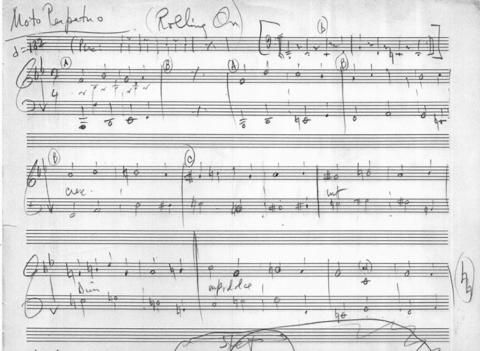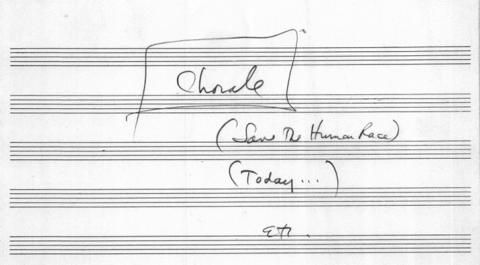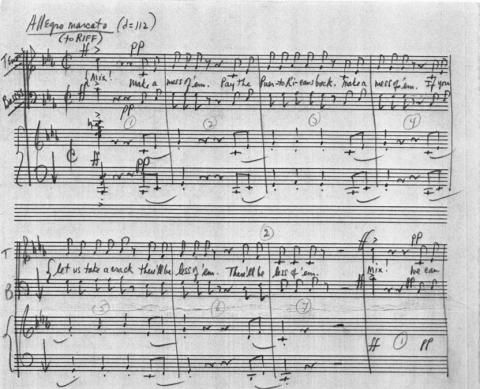We invited Nigel Simeone, author of The Leonard Bernstein Letters to share the fascinating story behind Chichester Psalms by celebrated Composer Leonard Bernstein.
On 10th December 1963, Walter Hussey, Dean of Chichester, wrote to the composer Leonard Bernstein requesting a composition for the Southern Cathedrals Festival in 1965. Inspired by Psalm 2, Bernstein’s Chichester Psalms has become one of the most performed of his concert works. Below we take a look at the unusual creation of this choral masterpiece and how it became such an invaluable part of Chichester Cathedral’s musical legacy.
The story began in August 1964. Following Bernstein’s agreement to compose a piece for the festival, Hussey wrote to him saying ‘I hope you will feel quite free to write as you wish and will in no way feel inhibited by circumstances. I think many of us would be very delighted if there was a hint of West Side Story about the music.’ Little did Hussey know quite how prophetic his comment would be.
Time moved on with Hussey receiving no update on the composition. Three days before Christmas, on 22 December 1964, he was clearly starting to get anxious about the looming deadline. He wrote to Bernstein saying ‘It would be a great help if I could know the title and description of the work within the next six weeks as our preliminary announcements and publications will be appearing very soon after that.’
That letter arrived just as Bernstein’s plans for a new Broadway show came crashing to a standstill. Bernstein had taken a sabbatical from his duties as Music Director of the New York Philharmonic to complete a musical based on Thornton Wilder’s The Skin of Our Teeth. Even though CBS invested $400,000 in TheSkin of our Teeth and promised to release the cast recording on Columbia Records, by the New Year, the whole project had fallen apart.
The surviving musical material for The Skin of Our Teeth was soon to become very significant for the Chichester Psalms. Hussey wasn’t aware of any of this when he wrote again in February 1965, but Bernstein’s reply, contained good news. The composer claimed that, ‘Suddenly a conception occurred to me that I find exciting. It would be a suite of Psalms, or selected verses from Psalms, and would have a general title like Psalms of Youth. The music is all very forthright, songful, rhythmic, youthful. The only hitch is this: I can think of these Psalms only in the original Hebrew.’
After that, progress was swift, and on 11 May 1965, Bernstein reported that the Psalms were complete, and had a new title: I am pleased with the work, and hope you will be, too; it is quite popular in feeling (even a hint, as you suggested, of West Side Story), and it has an old-fashioned sweetness along with its more violent moments. The title has now been changed to Chichester Psalms … In any case I wish you well with the piece; and I may even take your performance as an excuse to visit Sussex in late July. I should dearly love to hear this music in your Cathedral.
Clues to how Bernstein’s The Skin of Our Teeth was reimagined into his famous Chichester Psalms can be gleaned from a slim folder of sketches from the abandoned musical.
One of the first numbers in the collection is headed ‘Moto perpetuo (Rolling On)’, but what follows is very familiar to anyone who knows the Chichester Psalms: it’s the main, swaying tune of the first movement.

What’s missing from that sketch is the arresting opening of the first Psalm, but you don’t have to delve much further into the sketches of The Skin of Our Teeth to find it: a manuscript headed ‘Chorale: Save the Human Race’.

A second page of sketches for the Chorale has another tune that was originally intended for a song in the show called ‘Spring’, with the lyrics starting ‘Winds may blow’. This was soon to become the basis of the long alto solo in the second of the Psalms, setting Psalm 23.
Themes from the Chichester Psalms can be found throughout the folder with sources of the music in the first and third movements, and the setting of Psalm 23 in the second movement clearly reworked from The Skin of Our Teeth, but that leaves the rest of the second movement. Bernstein had a peculiarly apt piece up his sleeve for just this purpose: a number cut from West Side Story, called ‘Mix!’

Both Stephen Sondheim’s violent lyrics for the cut song and the words of Psalm are about the same thing: tribal conflict. In West Side Story it was a song in which the native New York gang, the Jets, expressed their violent hatred of the rival Puerto Rican Sharks. Its transformation in the Chichester Psalms, is the ‘touch of West Side Story’ which had been Hussey’s original starting point for the commission.
The bundle of sketches for the Chichester Psalms reveals that at least one of its themes existed even before West Side Story and The Skin of Our Teeth. An earlier manuscript leaf contains two tunes, both described by Bernstein in later annotations as dating from the 1950s. The first is for music eventually used for Psalm 23 in the second movement. The second is even more familiar: an early version of what became ‘There’s a Place for Us’ in West Side Story.
The Chichester Psalms is a triumph of musical recycling: a marvellous example of Bernstein’s genius for spotting the possibilities for reworking abandoned ideas. These were ideas that had originally been intended for two Broadway musicals rather than for a concert hall – let alone a Cathedral. This joyous and melodically rich ‘suite of Psalms’ is entirely derived from earlier material, but it feels completely coherent. Apart from the hint about West Side Story in his letter to Hussey, Bernstein never said a word about the origins of the music that made it into the Chichester Psalms, but the evidence is clear to see in his sketches and private papers.
Bernstein once wrote: ‘I have a deep suspicion that every work I write, for whatever medium, is really theatre music in some way’, and never was this more literally the case than with the Chichester Psalms. A preview article in The Times published ten days before the Chichester premiere, promised that ‘in its vigour and tunefulness, and in its vivid colour, the music is entirely typical of its composer.’ So it is – and Broadway’s loss was Chichester’s gain.
All illustrations are reproduced by courtesy of the Leonard Bernstein Collection in the Music Division of the Library of Congress, Washington, D.C.